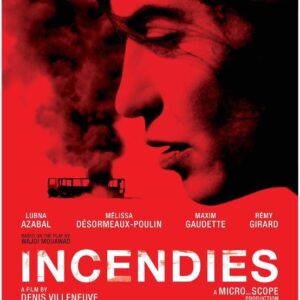“Childhood is a knife stuck in your throat.”
The notary read aloud Nawal Marwan’s last words encapsulated in her will as her children sat opposite him. He attentively read the rest of the document, muddled in ambiguities and obscurities, disclosing Nawal’s final requests for her children—to deliver two letters. She labeled the first envelope to the twins’ father, who they previously presumed dead, and the second to her long-lost son. As they coped with the sudden loss of their mother, the children tackled the unanticipated gain of two unknown family members, and their mother’s words stung true. Like a knife affixed to one’s throat, the family’s mysterious past lingers despite efforts to erase it, wounding generations years after its occurrence.
In Incendies, Canadian filmmaker Denis Villeneuve transports viewers across two timelines, capturing the intricacies of the Lebanese Civil War in the 1970s and its lingering impact decades later as two siblings attempt to unveil their mother’s past. Jeanne, Nawal’s daughter, travels to her mother’s native country, initiating the investigation of her untold history. Her brother Simon eventually joins, and the two uncover startling revelations of their familial origins. As the film narrates Nawal’s storyline through flashbacks, the audience attempts to piece together the mystery alongside the siblings.
Throughout the film, Villeneuve juxtaposes the film’s most harrowing scenes against the serene landscapes of the Middle East. Incendies’ opening scene exemplifies this cinematic tactic. A palm tree soundlessly sways among hills and greenery. This moment of tranquility becomes obstructed as the camera zooms out, revealing a shot taken through the window of an unknown room. The film turns its focus to a military officer with a razor in hand, shaving a young boy’s hair. As clumps of his hair fall to the floor, the camera highlights three black dots tattooed on the heel of the boy’s foot. The radiant panorama displayed at the beginning of the scene fades into a sense of gloom and dreariness. The scene’s ambiguous tone sets the mood for the film’s remainder.
The film takes inspiration from Wajdi Mouawad’s play of the same name. Incendies, a French word that roughly translates to “scorched,” never reveals the name of the country the movie’s plotline concerns. Villeneuve strategically omits any explicit references to real-life politics. His neutral approach disentangles the plot from ties to any country’s distinctive politics. However, the drama’s events mirror those of the Lebanese Civil War, particularly the story of the prisoner Souha Bechara. The director places elements of Bechara’s real-life experiences into Nawal Marwan’s fictitious plotline. The film captures Lebanon’s sectarian divisions, depicting Nawal, a Christian Lebanese, veiling her hair in one scene and embracing her cross necklace in the next as mechanisms for survival. Incendies draws from significant components of the multifaceted war, including the Palestinian Insurgency in southern Lebanon that initiated the conflict, the 1975 Beirut bus massacre, and the horrors of the Khiam prison.
Several of the issues Incendies tackles ring true today. Palestinian refugees in Lebanon maintain a second-class citizenship status and continue to live in “dire” conditions. Lebanon still witnesses sectarian divides, which have been the source of violent outbreaks in the twenty-first century and a stalemate in presidential elections. Villeneuve’s drama film remains relevant thirteen years following its release, establishing it as a must-see film.
Incendies is a raw film that explores myriad sensitive issues centering on a brutal conflict. The film best suits an audience older than 17. It includes profane language and scenes that visually capture the harsh sights of war, exhibiting blood and gore. Incendies additionally examines themes relating to domestic violence. Although the film mentions rape, it does not display the action as it occurs. It is generally a dark film that may be hard to watch as it does not hesitate to document the cruel reality of war. It is mentally demanding; however, its unembellished portrayal of issues impacting the Middle East affirms the film’s credibility and cultural significance. Incendies is ultimately a tale that captures the emotional intricacies of intergenerational trauma as a family seeks to end the “chain of anger.”
Initially premiered at the Venice Film Festival in 2010, the film represented Canada at the 83rd Academy Awards with its nomination in the Foreign Language Film category. In 2011, Incendies celebrated the victory of eight Genie Awards. As Incendies garners excessive praise, audiences can savor its electrifying cinematic qualities over a decade following its release.


